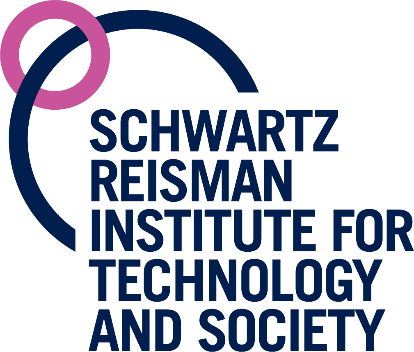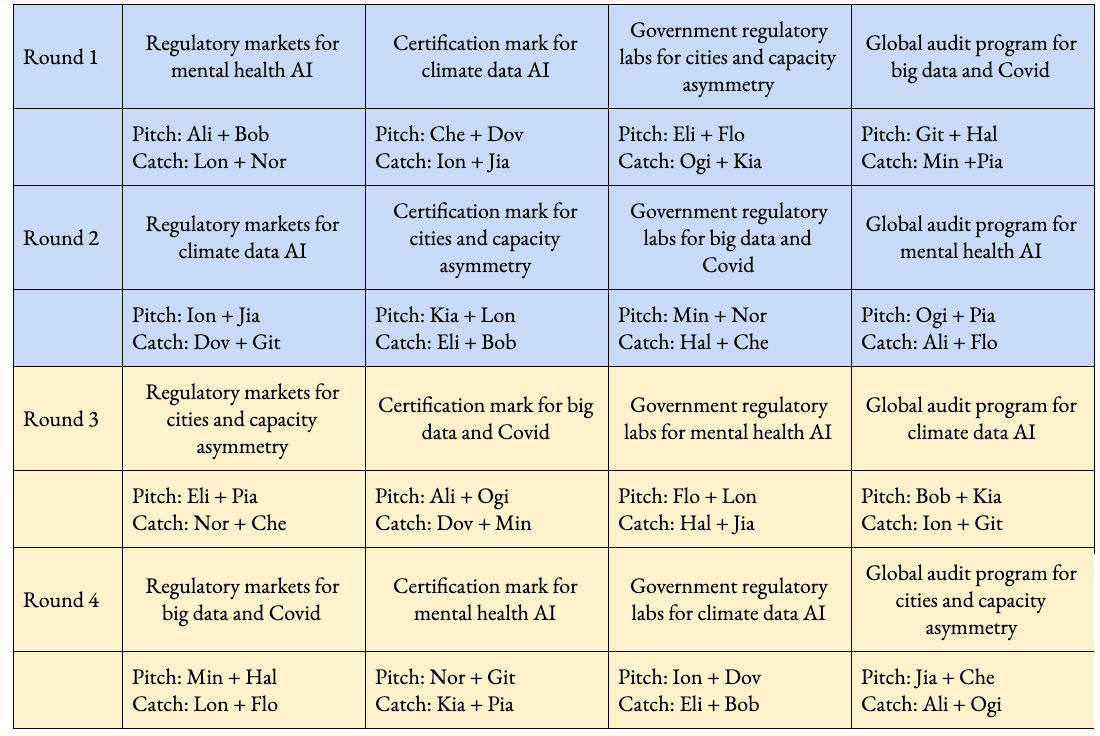Governing AI:
From Problems to Prototypes



Title Text
Subtitle
Test
The Stipulations
Workshop Plan and Goals
IN
- Four AI governance problems
- Four governance solutions
OUT
- outlines of four new/adapted governance institutions
- prototypes for proof of concept, potential, and feasibility.
In this workshop we will examine four concrete AI/data governance challenges and four genres of governance solutions.
We will think through how these known institutions of regulation and governance could be iterated to yield innovative new solutions that are fit for purpose for these problems but that are also scalable and extendable so that they can facilitate beneficial outcomes in wider categories of AI/data governance challenges.
Our goals for the end of the workshop are to produce
- the outlines of new/adapted governance institution for each challenge
- description of prototypes that can be built this year as proof of concept, communication of potential, and test of feasibility.
Teamification & Culture of Innovating Together
Each participant assigned to two pairs of problems/solutions to brainstorm about
Everyone meets two other participants prior to workshop.
Everyone explosed to two of our problems and two of our solutions.
Experience tells us that investment in creating a shared culture of collaboration pays handsome dividends.
We will start this in the weeks leading up to the workshop. We'll provide participants with some background material on some of the problem and solutions we want to analyze. We'll then pair participants up and ask them to do some brainstorming about how particular governance solutions might be applied to particular AI governance challenges. We'll ask participants to talk with their partners for an hour or so, make some notes that they can use in the workshop proper.
Each participant will be a part of two such pairs before the workshop.
Workshop Outline
Three phases: foundations, thinkings, doings
Here's the proposed shape of the workshop. We begin with "team building." The foundation for this is in pre-workshop working conversations between pairs of participants. Phase I of workshop starts as we follow up on this with some ice-breakers at the start of the workshop. After we've met our project teams we convene instead in professional pods for an exercise we call "Five Things Everyone Else Should Know about Our Field." Exercise 3 is a few rounds of Pitch & Catch using the brainstorming results of the pre-workshop tasks. We practice creative listening and iteration forward critique.
Phase II starts with project teams wrestling with Problem Analogies: how is our AI governance problem like and not like things we’ve solved before?
And then in exercise 5 we do this with solutions: What are the AI governance analogs in solutions we’ve implemented before?
This phase finishes with a search for what's still missin. What gaps do our analogy exercises reveal? What will it take to fill them in?
Phase III asks us to get pragmatic: What do we think we know? What do we know we don’t know? What don’t we know that we don’t know?
Exercise 8, In the Real World, asks us to think about where would it make sense to start? Where is the low hanging fruit?
And then we think about Intentional Prototypes. What do we need to build as a proof of concept? To resolve the most important unknowns? To communicate the possibilities? To ascertain whether this is at all feasible?
Prototyping the Workshop: Analogizing the Problem
Analogizing the Problem
Let's us take a sample problem, let's say, the use of predictive algorithms for determining whether one is released pending trial, required to post bail, or held without the option of bail.
Then we "spin" the game piece and it lands on "the need to regulate weights and measures" (in the US, it starts in Article 1, Section 8 of the constitution).
| LIKE | UNLIKE |
|---|---|
| constitutional questions both involve "standards" both involve "measurement" long legal history certification of identical devices used all over |
one is commerce, one people prediction vs. observation commerce vs. justice |
1: Teamification
GETTING TO KNOW ONE ANOTHER. OUR BOXES AND HOW TO THINK OUTSIDE THEM. COLLABORATIVE NORMS. WORKING CREATIVELY REMOTELY.
Interlude: Five Things Everyone Else Should Know.
PARTICIPANTS CONVENE BY SUBJECT AREA EXPERTISE AND BRAINSTORM BRIEF! PRESENTATIONS LAYING OUT WHAT ALL THE REST OF THE PEOPLE IN THE ROOM SHOULD KNOW ABOUT THEIR AREA OF EXPERTISE.
2: Dissecting and Mapping Problems
. TEAMS DECOMPOSE THEIR AI GOVERNANCE CHALLENGE INTO ITS COMPONENT DIMENSIONS USING A DECK OF "PROBLEM CARDS" DERIVED FROM PREPARATORY PAPERS - WHAT MAKES IT A PROBLEM? WHAT'S THE MATERIAL RISK? WHAT'S THE DISTRIBUTIONAL RISK? WHO ARE THE STAKEHOLDERS AND WHAT DO THEY CARE ABOUT? WHAT TRADEOFFS ARE IMPLICATED? - AND LOCATING IT IN A TOPOGRAPHY OF AI GOVERNANCE CHALLENGES.
3: Dissecting and Mapping Governance
TO SET THE STAGE FOR OUT-OF-THE-BOX THINKING ABOUT GOVERNANCE SOLUTIONS, TEAMS ENGAGE IN GOVERNANCE DESIGN EXERCISES: HOW MIGHT A WTO-LIKE ENTITY WORK FOR FACIAL RECOGNITION? HOW MIGHT ALGORITHMS BE REGULATED LIKE MEDICAL DEVICES? HOW MIGHT A NATIONAL TRANSPORTATION SAFETY BOARD-LIKE ENTITY RESPOND TO AI DISASTERS? A DECK OF "COMPONENTS OF GOVERNANCE" CARDS FACILITATES THE ANALOGICAL THINKING THIS EXERCISE REQUIRES.
4a: Customizing Governance to Fit the Problem
TEAMS ADDRESS THE SHORTCOMINGS OF ANALOGOUS SOLUTIONS BY DESIGNING NEW SOLUTIONS THAT COMBINE EXISTING GOVERNANCE COMPONENTS.
4b: Intentional Prototyping.
What needs finding out to know how to make this solution a going concern? Teams lay out what needs to be learned by doing and formulate the early stage prototypes that need to be set up for that purpose.
6: Making Work Plans
TEAMS MAP OUT WHAT IT WILL TAKE TO ROLL OUT
Resources
Organizations
Principles
Concepts
- Five Problems + Five Solutions
- Criteria 1: Some sponsor is interested
- Criteria 2: We can sketch a team to do it
- Outcome: What a team would need to get started
- Insight: Groups do not need to be working in parallel
Pre-Workshop Task I
Meet with another participant and brainstorm about a problem/solution pair
Write Design Prompts
Based on conversations with sponsors
Write Solution Sketches
Based on conversations with sponsors, December ideas, etc.
Pre-Workshop Task II
Meet with another participant and brainstorm about a problem/solution pair
Ex 1: Teaming
Build team culture, etc.
Ex 2: Five Things
Tell us what we should know.
Recruit Participants
From sponsors and based on problem/solution expertise
Ex 3: Pitch & Catch
Give + Take based on pre-workshop tasks. All problem/solution combos explored.
Ex 4: Problem Analogy
How is our AI governance problem like and not like things we’ve solved before?
Ex 5: Solution Analogy
What are the AI governance analogs in solutions we’ve implemented before?
Ex 6: Missing Parts
What gaps do our analogy exercises reveal? What will it take to fill them in?
Ex 7: Knowns & Unknowns
What do we think we know? What do we know we don’t know? What don’t we know that we don’t know?
Ex 8: In the Real World
Where would it make sense to start? Where is the low hanging fruit?
Ex 9: Intentional Prototypes
What do we need to build as a proof of concept? To resolve the most important unknowns? To communicate the possibilities?
Pre-Workshop Task I
Meet with another participant and brainstorm about a problem/solution pair
Write Design Prompts
Based on conversations with sponsors
Write Solution Sketches
Based on conversations with sponsors, December ideas, etc.
Pre-Workshop Task II
Meet with another participant and brainstorm about a problem/solution pair
Ex 1: Teaming
Build team culture, etc.
Ex 2: Five Things
Tell us what we should know.
Recruit Participants
From sponsors and based on problem/solution expertise
Ex 3: Pitch & Catch
Give + Take based on pre-workshop tasks. All problem/solution combos explored.
Ex 4: Problem Analogy
How is our AI governance problem like and not like things we’ve solved before?
Ex 5: Solution Analogy
What are the AI governance analogs in solutions we’ve implemented before?
Ex 6: Missing Parts
What gaps do our analogy exercises reveal? What will it take to fill them in?
Ex 7: Knowns & Unknowns
What do we think we know? What do we know we don’t know? What don’t we know that we don’t know?
Ex 8: In the Real World
Where would it make sense to start? Where is the low hanging fruit?
Ex 9: Intentional Prototypes
What do we need to build as a proof of concept? To resolve the most important unknowns? To communicate the possibilities?
Group/Team Prep

| Ali, Bob | ||||

Pitch and Catch
Organizational Environment
Data Environment
Risk Environment
Benefit Environment
Focus
TASK: FORM PROJECT TEAMS
- What do they look like? Size? Composition? Distributed?
- Who is on theme?
- When do they need to be set up by?
Global Certification Mark
Precision
Medicine
FDA
for
AI
Regulatory
Market
Global
Device Audit Program
Climate
Cities
Covid
Global Certification Mark
FDA
for
AI
Regulatory
Market
Global
Device Audit Program
Precision
Medicine
Climate
Cities
Covid
Global Certification Mark
FDA
for
AI
Regulatory
Market
Global
Device Audit Program
Global Certification Mark
FDA
for
AI
Regulatory
Market
Global
Device Audit Program
Precision
Medicine
Climate
Cities
Covid
Precision
Medicine
Climate
Cities
Covid
Ali
Bri
Che
Dov
Eli
Fra
Git
Hal
Ion
Jia
Kia
Lev
Mia
Noa
Ogi
Pia
Global Certification Mark
Precision
Medicine
FDA
for
AI
Regulatory
Market
Global
Device Audit Program
Climate
Cities
Covid
Fdn3
Fdn2
Fdn1
Rock
Global Certification Mark
FDA
for
AI
Regulatory
Market
Global
Device Audit Program
Precision
Medicine
Climate
Cities
Covid
Global Certification Mark
FDA
for
AI
Regulatory
Market
Global
Device Audit Program
Global Certification Mark
FDA
for
AI
Regulatory
Market
Global
Device Audit Program
Precision
Medicine
Climate
Cities
Covid
Precision
Medicine
Climate
Cities
Covid
Global Certification Mark
Precision
Medicine
FDA
for
AI
Regulatory
Market
Global
Device Audit Program
Climate
Cities
Covid
Global Certification Mark
FDA
for
AI
Regulatory
Market
Global
Device Audit Program
Precision
Medicine
Climate
Covid
Global Certification Mark
FDA
for
AI
Regulatory
Market
Global
Device Audit Program
Global Certification Mark
FDA
for
AI
Regulatory
Market
Global
Device Audit Program
Precision
Medicine
Climate
Covid
Precision
Medicine
Climate
Covid
Ali
Bri
Che
Dov
Eli
Fra
Git
Hal
Ion
Jia
Kia
Lev
Mia
Noa
Ogi
Pia
Ali
Bri
Che
Dov
Ion
Jia
Kia
Lev
Eli
Fra
Git
Hal
Mia
Noa
Ogi
Pia
Ali
Bri
Che
Dov
Eli
Fra
Git
Hal
Ion
Jia
Kia
Lev
Mia
Noa
Ogi
Pia
Ali
Bri
Che
Dov
Ion
Jia
Kia
Lev
Eli
Fra
Git
Hal
Mia
Noa
Ogi
Pia
Cities
Global Certification Mark
FDA for AI
Regulatory
Market
Global
Device Audit Program
Global Certification Mark
FDA for AI
Regulatory Market
Global
Device Audit Program
Precision
Medicine
Climate
Covid
Precision Medicine
Climate
Covid
Ali
Bri
Che
Dov
Eli
Fra
Git
Hal
Ion
Jia
Kia
Lev
Mia
Noa
Ogi
Pia
Ali
Bri
Che
Dov
Ion
Jia
Kia
Lev
Eli
Fra
Git
Hal
Mia
Noa
Ogi
Pia
Ali
Bri
Che
Dov
Eli
Fra
Git
Hal
Ion
Jia
Kia
Lev
Mia
Noa
Ogi
Pia
Ali
Bri
Che
Dov
Ion
Jia
Kia
Lev
Eli
Fra
Git
Hal
Mia
Noa
Ogi
Pia
Cities
Global
Device Audit Program
Global Certification Mark
Regulatory Market
Covid
Precision Medicine
Cities
FDA for AI
Climate
Global
Device Audit Program
Global Certification Mark
Regulatory Market
FDA for AI
Covid
Precision Medicine
Climate
Cities
Global Certification Mark
Precision
Medicine
FDA
for
AI
Regulatory
Market
Global
Device Audit Program
Climate
Cities
Covid
Fdn3
Fdn2
Fdn1
Rock
Precision
Medicine
Climate
Cities
Covid
Global Certification Mark
FDA
for
AI
Regulatory
Market
Global
Device Audit Program
Regulatory
Market
Precision
Medicine
Governing AI
By Dan Ryan
Governing AI
- 123



